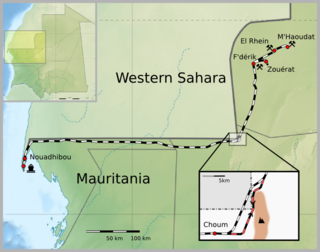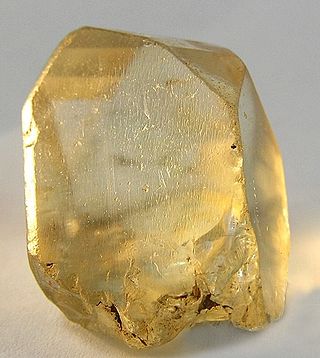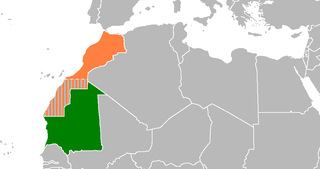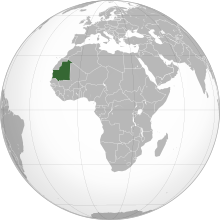The original inhabitants of Mauritania were the Bafour, presumably a Mande ethnic group, connected to the contemporary Arabized minor social group of Imraguen ("fishermen") on the Atlantic coast.

The economy of Mauritania is still largely based on agriculture and livestock, even though most of the nomads and many subsistence farmers were forced into the cities by recurring droughts in the 1970s and 1980s.

Citizens of Mauritania have various transportation methods. Railways and highways connect major cities in the country. Mauritania is a coastal country so there are many ports along its coast and there are a few big rivers that run through the country. Lastly, there are 26 airports spread out throughout the country.

Mining is the extraction of valuable geological materials and minerals from the Earth and other astronomical objects. Mining is required to obtain most materials that cannot be grown through agricultural processes, or feasibly created artificially in a laboratory or factory. Ores recovered by mining include metals, coal, oil shale, gemstones, limestone, chalk, dimension stone, rock salt, potash, gravel, and clay. The ore must be a rock or mineral that contains valuable constituent, can be extracted or mined and sold for profit. Mining in a wider sense includes extraction of any non-renewable resource such as petroleum, natural gas, or even water.

The Arab world, formally the Arab homeland, also known as the Arab nation, the Arabsphere, or the Arab states, comprises a vast group of countries, mainly located in Western Asia and Northern Africa. While the majority of people in the Arab world are ethnically Arab, there are also significant populations of other ethnic groups such as Berbers, Kurds, Somalis and Nubians, among other groups. Arabic is used as the lingua franca throughout the Arab world.
The term Islamic republic has been used in different ways. Some Muslim religious leaders have used it as the name for a theoretical form of Islamic theocratic government enforcing sharia, or laws compatible with sharia. The term has also been used for a sovereign state taking a compromise position between a purely Islamic caliphate and a secular, nationalist republic — neither an Islamic monarchy nor secular republic. In other cases it is used merely as a symbol of cultural identity.

Moktar Ould Daddah was a Mauritanian politician who led the country after it gained its independence from France. Daddah served as the country's first Prime Minister from 1957 to 1961 and as its first President of Mauritania, a position he held from 1960 until he was deposed in a military coup d'etat in 1978.

The Arab Maghreb Union (AMU) is a political union and economic union trade agreement aiming for economic and future political unity among Arab countries States that are located primarily in the Maghreb in North Africa. Its members are the nations of Algeria, Libya, Mauritania, Morocco and Tunisia. The Union has been unable to achieve tangible progress on its goals due to deep economic and political disagreements between Morocco and Algeria regarding, among others, the issue of Western Sahara. No high-level meetings have taken place since 3 July 2008, and commentators regard the Union as largely dormant.

The Mauritania Railway is the national railway of Mauritania. Construction of the line began in 1960, with it opening in 1963. It consists of a single, 704-kilometre (437 mi) railway line linking the iron mining centre of Zouérat with the port of Nouadhibou, via Fderik and Choum. The state agency Société nationale industrielle et minière (SNIM) controls the railway line.

Akjoujt is a small city in western Mauritania. It is the capital of Inchiri region. "Akjoujt" (ɑk'ʤuʤt) means 'wells'. The city's main industry is gold and copper mining.
Iron ore production in Africa is dominated by South Africa, Mauritania and Algeria. Many countries possess iron ore deposits that are as yet untapped/unmined. Countries and companies currently involved in production are listed here; measurements are in tonnes per annum(year).
Coal mining regions are significant resource extraction industries in many parts of the world. They provide a large amount of the fossil fuel energy in the world economy.

The following outline is provided as an overview of and topical guide to Mauritania:

The mining of minerals in Nigeria accounts for only 0.3% of its gross domestic product, due to the influence of its vast oil resources. The domestic mining industry is underdeveloped, leading to Nigeria having to import minerals that it could produce domestically, such as salt or iron ore. The rights to ownership of mineral resources is held by the Federal Government of Nigeria, which grants titles to organizations to explore, mine, and sell mineral resources. Organized mining began in 1903, when the Mineral Survey of the Northern Protectorates was created by the British colonial government. A year later, the Mineral Survey of the Southern Protectorates was founded. By the 1940s, Nigeria was a major producer of tin, columbite, and coal. The discovery of oil in 1956 hurt the mineral extraction industries, as government and industry both began to focus on this new resource. The Nigerian Civil War in the late 1960s led many expatriate mining experts to leave the country. Mining regulation is handled by the Ministry of Solid Minerals Development, who are tasked with the responsibility of overseeing the management of all mineral resources in Nigeria. Mining law is codified in the Federal Minerals and Mining Act of 1999. Historically, Nigeria's mining industry was monopolized by state-owned public corporations. This led to a decline in productivity in almost all mineral industries. The Obasanjo administration began a process of selling off government-owned corporations to private investors in 1999. The Nigerian Mining Industry has picked up since the "Economic Diversification Agenda", from Oil & Gas, to Agriculture, Mining, etc., began in the country.

Mauritania, officially the Islamic Republic of Mauritania, is an Arab Maghreb country in West Africa. It is bordered by the Atlantic Ocean in the west, by Morocco in the north, by Algeria in the northeast, by Mali in the east and southeast, and by Senegal in the southwest. It is named after the ancient Berber Kingdom of Mauretania, which later became a province of the Roman Empire, even though the modern Mauritania covers a territory far to the south of the old Berber kingdom that had no relation with it.

Mauritania and Morocco are both in the Maghreb, Morocco is in North Africa. The two countries have bordered each other since 1975, when Spain abandoned the Western Sahara most of which is now de facto under Moroccan control. The sovereignty of this territory remains disputed.

Mauritania, officially the Islamic Republic of Mauritania, is a sovereign country in Northwest Africa. It is bordered by the Atlantic Ocean to the west, Western Sahara to the north and northwest, Algeria to the northeast, Mali to the east and southeast, and Senegal to the southwest. By land area, Mauritania is the 11th-largest country in Africa and the 28th-largest in the world, and 90% of its territory is situated in the Sahara. Most of its population of 4.4 million lives in the temperate south of the country, with roughly one-third concentrated in the capital and largest city, Nouakchott, located on the Atlantic coast.

The mining industry of Liberia has witnessed a revival after the civil war which ended in 2003. Gold, diamonds, and iron ore form the core minerals of the mining sector with a new Mineral Development Policy and Mining Code being put in place to attract foreign investments. In 2013, the mineral sector accounted for 11% of GDP in the country and the World Bank projected a further increase in the sector by 2017.

India–Mauritania relations are the international relations that exist between the Republic of India and the Islamic Republic of Mauritania. Neither country has a resident ambassador.
The geology of Mauritania is built on more than two billion year old Archean crystalline basement rock in the Reguibat Shield of the West African Craton, a section of ancient and stable continental crust. Mobile belts and the large Taoudeni Basin formed and filled with sediments in the connection with the Pan-African orogeny mountain building event 600 million years ago and a subsequent orogeny created the Mauritanide Belt. In the last 251 million years, Mauritania has accumulated additional sedimentary rocks during periods of marine transgression and sea level retreat. The arid country is 50% covered in sand dunes and has extensive mineral resources, although iron plays the most important role in the economy.














